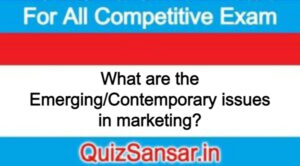
What are the Emerging/Contemporary issues in marketing?
What are the Emerging/Contemporary issues in marketing?
Or
Describe the Emerging/Contemporary issues in marketing?
Ans.
Emerging/Contemporary Issues in Marketing
Emerging marketing is considered an economic activity as it is an economic process by means of which goods and services are exchanged and their values are determined in terms of money prices. Business organisations are performing this job by sensing, serving and satisfying individual as well group consumers wants. Now relating to these concepts modern thinkers believe that marketing should extend its functions to satisfy the needs of society. Such thoughts giving a new dimension to marketing emerged into a concepts in marketing.
Following are the Emerging/Contemporary issues in Marketing –
1. Societal Marketing Concept- In societal marketing concept, companies aim profits while taking consumer satisfaction into consideration in short term and human welfare in long term. Thus, there are three things that must be involved for a company to implement societal marketing concept-
(i) Company (In terms of profit maximization)
(ii) Consumers (In terms of wants and satisfaction)
(iii) Society (In terms of human welfare)
2. Social Marketing – Social marketing is using marketing methods and marketing mix in order to solve social issues. It involves that marketing concept must develop a social consciousness. It is based on the thinking that marketing should be involved in vital social issues like removal of poverty, unemployment, environmental deterior, populations growth, etc. According to the advocates of social marketing, marketing must include more and more amount of services for the benefits of society and humanity. And also the profit made by the sales are donated to a special fund which is lent to hospitals, foundations, etc.
3. Not-for-Profit Marketing- Marketing is used for the not-for-profit organisations. Universities are examples to such organisations, as they use advertising not to increase profits but to increase the number of students that prefer that university.
4. Cause-Related Marketing – In such marketing, a company and a nonprofit organisation together start a marketing activity to draw people’s attention to an issue. Cause-related marketing provides benefit to both company and the organisation. It is beneficial for the company because it creates a positive public image and it also increases sales of the brand and it is also beneficial to the organisation because they will be able to reach new sources of funds which they deprive of in most cases and they will obtain greater visibility.
5. Sports Marketing – “Sports marketing is the use of marketing principles for or within the sports related environments. In sports marketing, the marketed products are non-sports products but the channels used to reach the target market are sports related. Master card sponsorship and advertisement in the champions league and the World Cup can be accepted as well-known advertisement. This marketing strategically aims marketing the pure sports goods to the target market.
6. Guerilla Marketing- Guerilla marketing is a form of marketing whose target markets exist in unexpected places; the product is marketed in a memorable and attractive manner. The aim of this marketing is to reach more people with a limited budget and a more effective message. Customers are shocked and surprised in guerilla marketing, so they can remember things that surprise them. Some key elements of guerilla marketing are creativity, unexpectedness, more with less etc.
7. Viral (Buzz) Marketing- Viral (Buzz) marketing is marketing technique that encourages people to spread their message to others, to create difference in the short time. In viral marketing, the message quickly spreads like a virus from one person to another. We tell two friends and then they tell two friends, because it is form of “word of mouth”. Social networks can play a key role in spreading our messages. They can be very successful in reaching a large number of people rapidly.
8. Experiential Marketing – Experiences occur when customer meets with a product and use it. They play a vital role while making the purchase decision. They provide greater interaction between firm and consumer. Firms focus on their customers with the help of the emotional appeals to affect their senses. Experiential, marketing differs from traditional marketing in four ways.
(i) Experience of customers.
(ii) Focus on consumption
(iii) Ecletic Method
(iv) Rational and Emotional ones
9. Digital Marketing – Digital or online marketing is the marketing of products and services via Internet as its medium. Digital marketing is a technique which uses the digital channels and platforms. Thus to co-ordinate with new technologies, marketers should develop strategies which suits the digital world.
10. Search Engine Marketing – Search Engine marketing is defined as a form of Internet marketing that seeks to promote websites by increasing their visibility in search result pages through the use of search engine optimization.
11. Tourism Marketing- Tourism marketing is the managerial process of anticipating and satisfying existing and potential visitors wants more effectively then competitive suppliers or destinations. The management of exchange is driven by profit, community gain or both; either way long-term success depends on a satisfactory interaction between consumer and supplier. It also means securing environmental and societal needs as wee a core consumer satisfaction. They can no longer be regarded as mutually exclusive.






